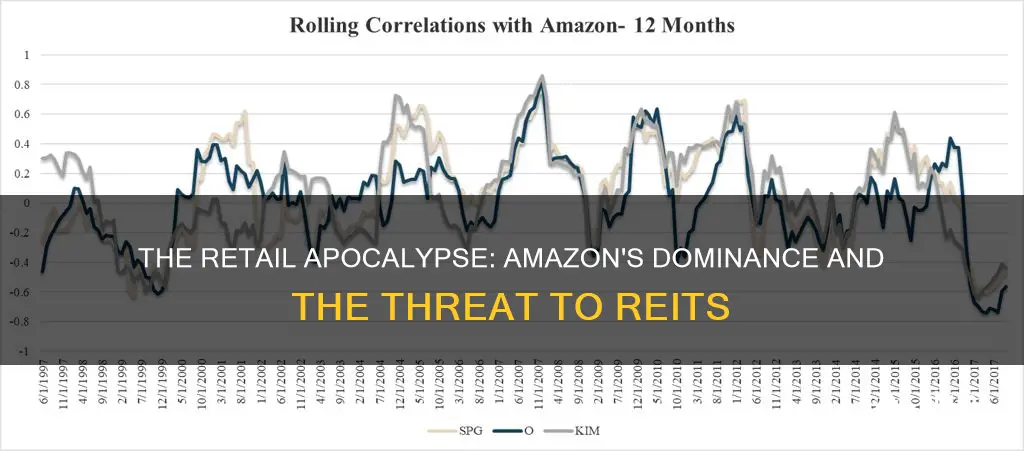
Amazon's influence on the real estate market has been dubbed the Amazon Effect, and it has had a profound impact on the commercial real estate market. The company's rapid expansion and insatiable demand for industrial properties have made it one of the most coveted tenants for property owners. This has resulted in industrial distribution properties becoming highly sought-after assets.
However, in May 2022, Amazon announced plans to cut costs in its logistics network, leading to a decline in industrial REITs. Despite this, the broader industrial vacancy rates remain at record lows, indicating that the issues might be company-specific.
Amazon's presence in the real estate market has also opened up opportunities for investors to benefit from the demand for industrial properties. One way to do this is through Real Estate Investment Trusts (REITs). REITs are companies that own or finance commercial rental properties, and they have consistently outperformed other investments in terms of total returns.
In conclusion, while Amazon's presence has had a significant impact on the real estate market and REIT investments, it is important to consider the broader market trends and company-specific issues when evaluating the potential risks and opportunities.
What You'll Learn

Pros and cons of investing in REITs
REIT stands for Real Estate Investment Trust. A REIT is a company that owns or operates properties that generate income. Investors can buy shares of REITs as a way of investing in different parts of the real estate market.
Pros of Investing in REITs:
- Diversification: A diverse portfolio can reduce an investor's risk because money is spread across different assets and industries. Investing in a REIT can help diversify a person's investment portfolio.
- Dividends: REITs are required by law to pay at least 90% of their income in dividends. The management can decide to pay out more than 90% but can't drop below that percentage.
- Zero corporate tax: REITs get a significant tax advantage—they don't have to pay corporate tax.
- Tangibility: REITs are investments in physical pieces of property. Those tangible assets can increase in value over time.
- Liquidity: Compared to buying an investment property, investing in REITs is relatively liquid. It takes much less time to buy and sell a REIT than it does a rental property.
Cons of Investing in REITs:
- Taxes on dividends: Dividends from REITs are typically taxed at a higher rate than other investments. Oftentimes, they are taxed at the same rate as a person's ordinary income.
- Sensitive to interest rates: REITs can be hypersensitive to changes in interest rates. Rising interest rates can spell trouble for the price of REIT stocks.
- Value can be influenced by trends: REITs can fall prey to risks associated with the property. For example, if a person invests in a REIT that's specifically a portfolio of frozen yogurt shops in strip malls, they could see their investment take a hit if frozen yogurt or strip malls fall out of favor.
- Plan for a long-term investment: REITs are better suited for long-term investments, which can typically be thought of as those longer than five years.
Will Amazon Kill REIT Investment?
There is no clear answer to this question, but it is worth noting that Amazon's recent announcement to cut costs in its logistics network has resulted in declines of 20-30% for industrial REITs. Amazon is the largest industrial REIT tenant, but it still only comprises 3-5% of the total occupied space. The broader industrial vacancy rates remain at record lows, so the issues seem to be company-specific.
Additionally, Amazon's insatiable demand for industrial distribution properties has made them the most desired and top-tier credit tenant for these properties.
Where Should Retirees Invest Now?
You may want to see also

How to invest in REITs
Real Estate Investment Trusts (REITs) are a great way to diversify your portfolio outside of traditional stocks and bonds. They are a key consideration when constructing an equity or fixed-income portfolio.
REITs are companies that own or finance income-producing real estate across a range of property sectors. They are a security that trades like a stock on major exchanges and owns—and in most cases operates—income-producing real estate or related assets. Many REITs are registered with the SEC and are publicly traded on a stock exchange.
There are two main types of REITs: Equity and Mortgage. Within Equity REITs, there are subcategories based on the types of properties held in the REIT.
- Equity REITs own and manage properties and collect payments from tenants.
- Mortgage REITs invest in mortgages and derive their income from interest payments.
You can invest in REITs in a variety of different ways, including purchasing shares of publicly traded REIT stocks, mutual funds, and exchange-traded funds.
- Determine your investor profile: Are you more of a hands-on or hands-off investor? This will help you decide whether to invest directly in REITs or through an exchange-traded fund or mutual fund.
- Research and analyse: Look into the different types of REITs available and consider factors such as the industry, property type, occupancy rates, and financial health.
- Choose a brokerage account: You can open a brokerage account with a firm like Schwab, which offers a Schwab One® brokerage account for buying and selling REITs.
- Review possible REIT investments: Use the education and research tools provided by your brokerage platform to review and analyse potential REIT investments.
- Make your investment: Once you've chosen a REIT that fits your financial needs and goals, proceed to buy it through your brokerage account.
- Monitor your investment: Periodically review your REIT investment to track its performance and make any necessary adjustments.
REITs offer benefits such as high-yield dividends, portfolio diversification, and liquidity. However, there are also risks to consider, including tax liabilities and sensitivity to interest rates.
When investing in REITs, it's important to consider your financial goals, risk tolerance, and investment horizon. While REITs can provide strong returns and income, they may not be suitable for everyone, so be sure to do your research and consult a financial professional if needed.
Employee Compensation: Strategic Investment or Necessary Expense?
You may want to see also

What qualifies a company as a REIT
Real Estate Investment Trusts (REITs) are companies that own, operate, or finance income-producing real estate. They were created to allow smaller investors to access large-scale, income-producing commercial real estate. REITs are required to meet several criteria to qualify as such.
To qualify as a REIT, a company must:
- Invest at least 75% of its total assets in real estate, cash, or similar investments.
- Derive at least 75% of its gross income from rents, interest on mortgages financing real estate, or sales of real estate.
- Pay out at least 90% of its taxable income to shareholders as dividends each year.
- Be an entity that is taxable as a corporation.
- Be managed by a board of directors or trustees.
- Have a minimum of 100 shareholders.
- Have no more than 50% of its shares held by five or fewer individuals.
- Be jointly owned by 100 or more persons (beginning in the second tax year).
- Have transferable shares or transferable certificates of interest.
- Not be a financial institution or an insurance company.
- Not be closely held, as defined by tax laws.
These requirements ensure that REITs remain accessible to a broad range of investors and provide stable income through dividends.
Retirement Reinvented: Exploring the Right Mix for Your Investment Portfolio
You may want to see also

Different types of REITs
Real Estate Investment Trusts (REITs) are a great way to diversify your portfolio and hedge against risk and inflation. There are several types of REITs, each with its own unique characteristics and risks. Here are some of the most common types:
Equity REITs (eREITs)
These are the most common type of REITs, and they own and manage income-producing real estate. The revenue is generated from the rents paid by tenants of these properties, which can include offices, shopping centres, hotels, and apartments. Equity REITs are similar to mutual funds, as they allow individuals to invest in shares of the company as a whole and benefit from the appreciation and profits of the assets.
Mortgage REITs (mREITs)
Mortgage REITs don't own any physical assets. Instead, they invest in real estate mortgages or mortgage-backed securities tied to residential or commercial properties. They earn interest on these investments, and the interest rates can impact their performance. Mortgage REITs play a crucial role in providing liquidity to the residential and commercial mortgage markets.
Hybrid REITs
Hybrid REITs, as the name suggests, combine the investment strategies of equity and mortgage REITs. They invest in both properties and mortgages, providing a middle ground for investors who want exposure to both types of investments.
Office REITs
Office REITs are a sub-category of equity REITs, focusing on renting out office spaces to tenants. This type of REIT has gained popularity with the rise of co-working and flexible office space demand.
Retail REITs
Retail REITs invest in shopping malls, outlets, and other retail centres, earning rental income from a wide range of retail stores.
Residential REITs
Residential REITs own and manage various forms of residences, including apartment buildings, student housing, and single-family homes. They rent out these spaces to tenants and can also focus on specific geographical markets or property types.
Healthcare REITs
Healthcare REITs invest in real estate related to healthcare facilities, such as hospitals, medical centres, nursing facilities, and retirement homes. The success of these REITs is closely tied to the healthcare system and its funding.
Industrial REITs
Industrial REITs own and manage industrial facilities, such as warehouses and distribution centres. They play a crucial role in e-commerce by helping meet the rapid delivery demands of online shopping.
Lodging/Resort REITs
These REITs focus on the hospitality sector, owning and managing hotels, motels, and resorts. They cater to a diverse range of customers, from business travellers to vacationers.
Timberland REITs
Timberland REITs are a unique type of REIT that specialises in managing and selling timberland real estate. They generate income by harvesting and selling timber.
Data Centre REITs
Data centre REITs own and manage facilities that provide data storage and security services to customers. They offer a range of products and services to ensure the safety and uninterrupted operation of servers and data.
Telecommunications REITs
Telecommunications REITs own and manage infrastructure real estate, such as fibre cables, wireless infrastructure, and telecommunications towers. They collect rent from tenants occupying these properties.
Specialty REITs
Specialty REITs focus on unique property types that don't fit into the other categories. This can include movie theatres, farmland, and outdoor advertising sites.
Public Non-Traded REITs and Private REITs
These REITs are not traded on national stock exchanges but are still open for investment. They may have lower liquidity than publicly traded REITs and are subject to different regulatory requirements.
Jesus Invested in People Through Love and Sacrifice
You may want to see also

Amazon's impact on industrial REITs
Amazon's impact on industrial real estate investment trusts (REITs) has been a topic of discussion and concern among investors in recent years. As the e-commerce giant, Amazon has significantly influenced the commercial real estate market, particularly in the industrial REIT sector. Here are some key insights and paragraphs on the impact of Amazon on industrial REITs:
Amazon's Influence on the Industrial REIT Market
Amazon has been a major driver of the demand for industrial real estate, especially with its push for two-day and same-day delivery, which has sparked a "supply chain arms race" among retailers and logistics providers. This has resulted in a significant increase in the demand for industrial space, as companies seek to enhance their supply chain resiliency and speed up goods distribution. Amazon's presence in the industrial REIT market has made it one of the fastest-growing tenants, with plans to open 1,000 small delivery hubs near population centers. This has led to a predicted need for an additional 1.5 billion square feet of industrial space in the US within the next five years.
The "Amazon Effect" and Investor Opportunities
The "Amazon Effect" has reshaped consumer behaviour and global supply chains. Amazon's presence as a tenant has made industrial properties highly desirable for investors. Amazon operates on triple net leases, where they cover most operating expenses, including maintenance, insurance, and property taxes. This arrangement is advantageous for property owners, who benefit from reduced operating expenses. The demand for Amazon industrial assets has created opportunities for small and mid-sized investors to tap into the earnings potential through passive real estate investing and tax-deferred 1031 exchanges.
Amazon's Plans to Cut Costs and Impact on Industrial REITs
In May 2022, Amazon's announcement to cut costs in its logistics network caused a stir in the industrial REIT sector. Amazon's decision to pump the brakes on its pandemic-fueled expansion led to a decline of 20-30% in industrial REIT stocks. However, it's important to note that Amazon comprises just 3-5% of total occupied space, and the overcapacity issues seemed to be specific to the company rather than a broader trend. The broader industrial vacancy rates remained at record lows, indicating that the impact on the overall industrial REIT market was limited.
Prologis' Response to Amazon's Announcement
Prologis (PLD), a leading industrial REIT, addressed the concerns raised by Amazon's announcement during its second-quarter conference call. Prologis' management team brushed away the idea that Amazon was cooling off the industrial real estate market. They stated that the rumours of Amazon putting a significant amount of space back on the market were unsubstantiated. Prologis also highlighted the shift in demand drivers for warehouse space, with a focus on transportation, healthcare, and auto sectors, rather than a slowdown.
Amazon's Impact on Pricing Power and Competition
Amazon's push into logistics and its potential impact on industrial REIT pricing power is a factor that investors should consider. Amazon's growing presence in the logistics space may allow it to dictate the terms of its relationships with industrial REITs. Additionally, Amazon's size and influence could disintermediate third-party logistics providers, impacting the dynamics of the industrial REIT sector. However, it's important to note that industrial REITs own a higher relative percentage of higher-value distribution-focused assets, which may provide some protection against Amazon's potential dominance.
Gladstone Investment: Unlocking Monthly Dividend Potential
You may want to see also
Frequently asked questions
A Real Estate Investment Trust (REIT) is a company that acquires, owns, and operates income-producing real estate or real estate loans. REITs combine the benefits of real estate and stock investments, providing access to income-producing commercial real estate for all investors.
REITs offer passive income through high dividends and tax advantages. They also provide diversification from the stock market, as they tend to be less volatile than other stocks. Additionally, REITs don't pay federal corporate income tax, shielding investors from double taxation.
REITs may have higher tax liabilities due to non-qualified dividends. They are also sensitive to changes in interest rates and may decline as interest rates rise. Other risks include property-specific issues, such as tenant move-outs and industry headwinds, as well as the potential risks of using too much debt.
Amazon's impact on REITs depends on various factors. While Amazon is a major player in the e-commerce industry and has influenced the demand for industrial properties, it is important to note that Amazon only comprises 3-5% of total occupied space in industrial REITs. The broader industrial vacancy rates remain at record lows, indicating that overcapacity issues may be company-specific. Therefore, while Amazon's actions can influence specific REITs, the overall REIT market is diverse and influenced by multiple factors.







